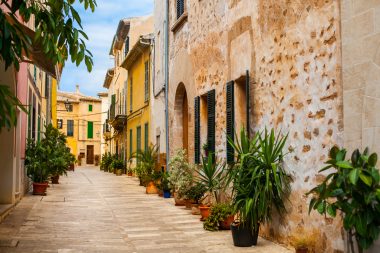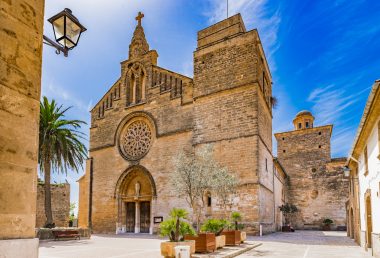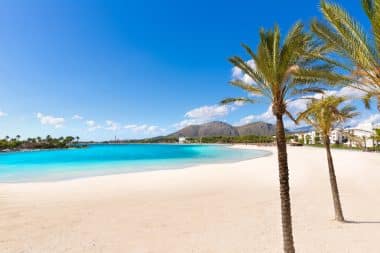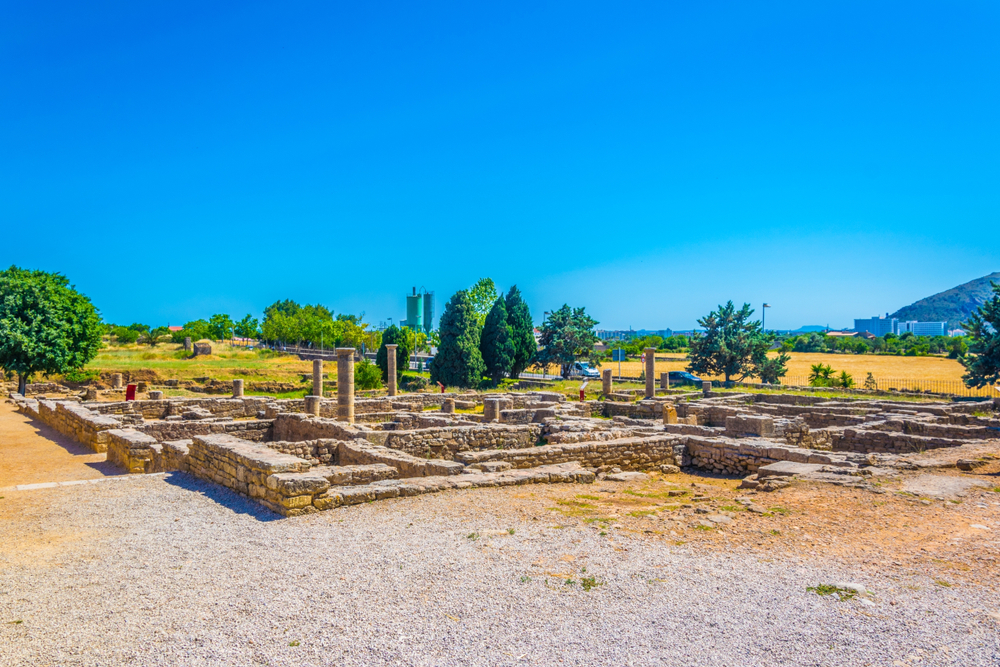The medieval town of Alcudia is the largest tourist stronghold in the north of the island
Mallorca and is located on a peninsula that separates the bays of Pollenca and Alcudia.
With its beautiful medieval town centre, it attracts many visitors all year round.
tourists. Alcudia is a perfectly preserved town, built on the site of a Roman
settlement, of which old buildings and a theatre have been preserved. The labyrinth of
small streets with ancient houses on both sides, exudes a unique
atmosphere and has been lovingly restored as part of the new tourist image of the island of Mallorca
restored. Alcudia is located about a five-minute drive from the coast and
should not be confused with the beach resort Port d’Alcudia.
Many of the oldest Mallorcan settlements were built several kilometres inland to protect them from vagabond pirates. Ports and coastal areas were only developed later, when tourism became one of the main sources of income on the island.
History of Alcudia

The first settlements in Alcudia date back to 2000-1300 BC.
Remains have been preserved to this day in La Cova de S’Hort del Rectora and under the Roman theatre. After Phoenicians and Greeks settled, the city experienced
its heyday in the 2nd century, when the Romans invaded the country and declared it their capital. The Romans put an end to piracy and built roads and
Sewers.

After the collapse of the Roman Empire in the In the 5th century, Alcudia was destroyed by vandals in the 6th century. The city returned to its former greatness under the control of the Moors, who built Al Qudya. The narrow streets of the old town, especially Carrer d’en Serra, bear witness to the Arab past. The walls that surround Alcudia today were built in the early 14th century after the Spanish conquest under the reign of King Jaume II to protect the inhabitants from further attacks. The Portal de Moll, with its two angular towers and two large palm trees, became the symbol of Alcudia. Another building from this period is the Ca’n Torro Library, located on Carrer d’en Serra and opened in 1990 for concerts and exhibitions. Alcudia was opened up for tourism in the 20th century.
Sights
The ancient history of Alcudia has given the town a rich heritage of sights. The remains of Roman buildings are among the most famous attractions. The city is also home to the smallest Spanish theatre in the country, where you can admire the remains of the first settlements. Archaeological excavation sites offer interested parties the opportunity to delve deeper into the history of the region. Free guided tours are offered in Alcudia on Wednesdays between 10am and 12pm and start at the church.
The city centre with its historic walls can also be explored on your own and allows you to see the courtyards of the sumptuous buildings of this era as well as the neo-Gothic church of Sant Jaume from the 19th century. Contemporary art enthusiasts should visit the Sa Bassa Blanca Museum, which houses paintings from the 16th to the 16th centuries 19th Century and Sculptures 20th century. Nature-loving visitors will find retreats from the tourist strongholds in the two nature parks S’Albufera and S’Albufereta, which are located near Alcudia. These wetlands are great for birdwatching rare species.
Beaches in Alcudia

With its proximity to the coast, most of the beaches are only a few kilometres away from Alcudia. A bus connection connects the town with Port d’Alcudia and runs along Playa de Muro to the smaller tourist resort of Ca’n Picafort. The beaches all consist of
of fine sand, offer sky-blue waters and are shallow enough for families with
small children can enjoy a bath. Parasols and sun worshippers dominate
the picture of the northern coastline, the further south it goes, the quieter and more beautiful
the environment. Of course, the island also offers a wide range of water sports
commandment.
Events in Alcudia
In Alcudia there are lively markets every Tuesday and Sunday between 8:30 am and 1:30 pm
within the historic city walls. In addition to souvenirs, all kinds of local fabric and leather goods are offered. Numerous small cafés invite you to linger with their terraces to soak up the local atmosphere and relax from the hustle and bustle of the market.
Throughout the year, Alcudia hosts many traditional festivals and fairs. The most famous are the agricultural fair in spring and the harvest festival at the beginning of October. They offer food, music and entertainment, among other things. Another popular celebration is the Seafarers’ Festival in April, on the occasion of which the city’s restaurants conjure up culinary delicacies and a boat exhibition is also held. The coastline of the region is a hotspot for sporting events with the Mallorca 312 cycling race and the Ironman.
Specialties
The restaurants of Alcudia specialize in traditional Mallorcan food. Ca’n Costa, the oldest restaurant in town, serves hearty stews, rice and fish stews. But there are also plenty of establishments that offer typical Spanish tapas. At S’Arc, regional cuisine is given a modern twist and combines Mediterranean dishes with local spices. Friends of Italian cuisine will find Osteria el Patio a wonderful little restaurant with authentic Italian fare and first-class service.
The crowning glory is the Michelin-starred Jardin, the culinary
delicacies of Mallorcan and Mediterranean cuisine.


